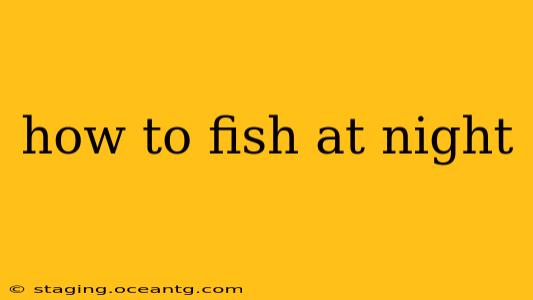Fishing at night offers a unique and often rewarding experience. The stillness of the night, the different behaviors of fish under the cover of darkness, and the potential for catching larger or more elusive species can be incredibly appealing to anglers. However, night fishing requires specific techniques and preparation to be successful. This guide will equip you with the knowledge and strategies to make your nocturnal fishing adventures fruitful and safe.
What Fish Bite at Night?
Many species of fish are more active at night, including catfish, carp, bass, crappie, and certain types of trout. Nocturnal feeding patterns are often influenced by prey availability. For example, baitfish that are more active at night become the primary food source for many predatory fish, leading to increased feeding activity. Understanding the local fish species and their nocturnal habits is crucial for targeting the right species.
What Gear Do I Need for Night Fishing?
The right gear is essential for a safe and productive night fishing trip. Here's what you should consider:
-
Powerful Headlamp or Flashlight: Essential for navigating in the dark and ensuring your safety. Choose a headlamp that allows for hands-free operation. Red light is often preferred, as it's less disruptive to fish's night vision.
-
High-Quality Fishing Rod and Reel: A sturdy rod and reel suitable for the species you're targeting is vital.
-
Appropriate Line and Tackle: Consider using a heavier line at night to handle larger fish and potentially snags in low-visibility conditions. The right hooks, lures, and weights are also crucial.
-
Reliable Bait: Live bait often works well at night, such as worms, minnows, or crayfish. Artificial lures like crankbaits, spinnerbaits, and jigs can also be effective.
-
Safety Gear: Don't forget essential safety gear, including a life vest, especially if fishing from a boat.
What are the Best Techniques for Night Fishing?
Night fishing requires adapting your techniques to the lower light conditions. Here are some effective strategies:
-
Using Lights Strategically: While red light is generally preferred, strategically placed, low-intensity white lights can sometimes attract baitfish, which in turn can draw in larger predatory fish.
-
Slow and Steady Retrieval: A slower, more deliberate retrieve can be more effective at night as fish rely more on vibration and scent to detect their prey.
-
Focusing on Structure: Fish often congregate near structures like docks, drop-offs, and submerged vegetation at night for cover and protection.
-
Using Scent Enhancers: Adding scent enhancers to your bait or lures can increase their attractiveness in low-light conditions, especially if the water is murky.
What is the Best Time to Night Fish?
The best time to night fish usually corresponds to the fish's peak feeding periods. This often coincides with dawn and dusk transitions (often referred to as the "golden hour" and "blue hour"). However, periods of darkness between these transitions can also yield good results, particularly during warmer months. Check local fishing reports and consider moon phases, as the brightness of the moon can influence fish behavior.
How Can I Stay Safe While Night Fishing?
Safety is paramount when night fishing. Here are some vital safety precautions:
-
Inform Someone of Your Plans: Let someone know where you're going, when you expect to return, and the details of your fishing spot.
-
Check the Weather Forecast: Be aware of any potential weather hazards before heading out.
-
Bring a First-Aid Kit: Be prepared for minor injuries.
-
Use Appropriate Lighting: Adequate lighting helps you avoid accidents.
-
Be Mindful of Your Surroundings: Pay attention to your surroundings to avoid tripping hazards.
What are Some Popular Night Fishing Spots?
The best night fishing spots are typically areas with good cover and access. These could include lakes, rivers, ponds, or even ocean piers, depending on the species you're targeting. Remember always to check local regulations and obtain any necessary permits before fishing.
By following these tips, you can greatly increase your chances of a successful and safe night fishing experience. Remember that patience and adaptability are key elements to master this unique form of angling. Happy fishing!
